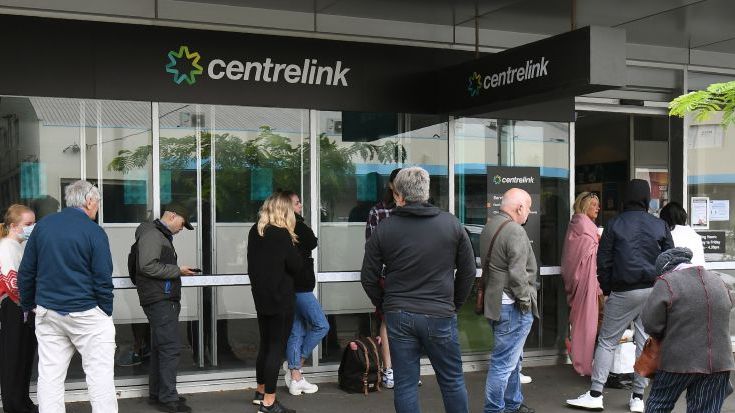
Homelessness and poverty are inextricably linked.
If we want to end homelessness, we must also end poverty. Two major policy responses to substantially reduce poverty, and homelessness, have been put forward strongly for at least a decade. Both could also have a substantial impact as an economic stimulus as we navigate the fallout of the COVID-19 pandemic. Firstly, immediately lift Job Seeker payments permanently and secondly, build more public and social housing.
Our lack of affordable housing and our lack of adequate welfare payments has pushed too many people into poverty over the past two decades. Last week, against a majority of economic advice, our government chose to not address poverty in this country. The mindset that ‘the best form of welfare is a job’ is simplistic and damaging. In fact, in the last census, 30% of people who identified as homeless had some form of work.
#raisetherate
The welfare system is there to support people who can’t work or help people until they are back in work. If the level of support is so low that all you do is survive you can’t look for work effectively and your well-being is severely impacted. Poverty is crippling. It is constant and corrosive. This year, the Federal Government’s COVID-19 stimulus payments lifted hundreds of thousands of Australians out of poverty, with many recorded, positive benefits, but they are only providing this lift temporarily. Winding back Job Seeker and Job Keeper will reportedly push 740,000 back into poverty. While at the same time tax cuts are being given to those in employment. There have been calls to #raisetherate of the old New Start payment for over a decade and experts have recognised that these lower payments just aren’t enough to lift people out of poverty and survival mode, while damaging people caught in an endless cycle of disadvantage.
Affordable Housing
Housing is a human right and the launch pad to a fulfilling and productive life. Affordable housing for people on a low income is also key to ending poverty and homelessness. Over the past 30 years Australia has chosen not to build and support public housing. This has left us as one of the OECD countries with the least public housing as a % of housing stock. At the same time policies have led to Australia having one of the most unaffordable housing markets in the world. If you can’t house your citizens then you have a broken housing sector. Australia has backed the private rental market as our solution to affordable housing and it hasn’t worked. In our inequitable housing market tax-payers support people with several houses to own more houses through tax breaks and incentives. The result is that there are estimates of close to 1 million empty or underutilised houses and flats across Australia. We have our priorities all wrong.
The Recent Budget
Last week’s Federal budget should have been an opportunity to start to reset our economy and our communities, learning from the fault lines exposed by the COVID-19 pandemic. If we are going to spend all this money then why not try to fix some of the enduring issues we are facing such as poverty and homelessness. There was also no revaluing of care work (in aged care, child care, disability care and community care), or policies to provide universal, affordable, quality childcare. Or a commitment to enable participation in secure and long-term employment, rather than casual and part-time work. The Budget was an opportunity to invest in people and communities but instead it was all about businesses. Incredibly, when you look closely at the numbers, funding for specialist homelessness services was cut by $43 million next year, despite the increased demand for services as a result of the ongoing economic crisis.
Think Differently
Last week an opportunity to think differently and tackle major challenges was lost. But we must think differently if things are to change. Two recent studies have shown that there are new ways of thinking to consider, when it comes to both poverty and homelessness. Both are worth a read…
A Vancouver-based research project gave homeless individuals cash and tracked their progress for a year. The 50 cash transfer recipients not only found stable housing, they freed up space in shelters and, according to project data, saved the shelter system $8,100 per person over those 12 months.
A study out of Finland, by McKinsey and Company looked at the impact of Universal Basic Income. The study found increased levels of employment, big increases in well-being and positive feedback loops.
At the same time as these studies in Canada and Finland, in Australia, we seem to be heading back to the Victorian era, where poverty is seen as some kind of moral failing and that blame is firmly on the individual, not the policies of Government.
Final Thoughts
Structural barriers trap people in intergenerational poverty and also assign people to poverty when they become unemployed. We must acknowledge that poverty and homelessness are not the failure of the individual. They are the failure of Government policy. We must keep campaigning to build more public and social housing and raise the rate of Job Seeker permanently. The status quo is expensive and deeply damaging to the people caught in poverty.
SmartMeals
Hunger is a manifestation of poverty. Currently we are seeing extraordinary demand for food relief across communities in Australia. StreetSmart’s response has been to establish SmartMeals. If you want to help someone right now why not buy them a hearty, nutritious meal – all details here








